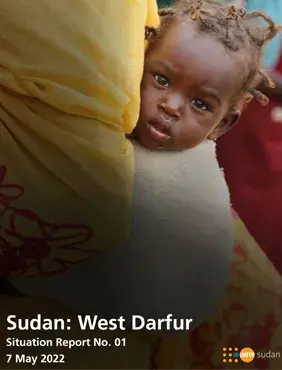SITUATION OVERVIEW
Renewed inter-communal conflict erupted in Kereneik locality in West Darfur in April 2022 with approximately 200 people killed and 100 injured and the reported destruction of homes, villages and medical clinics.1 Fighting spread to Ag Geneina on 25 April 2022 where the situation remained extremely tense, with a continued risk of escalation.
While fighting has since subsided in Kereneik, access to life-saving sexual and reproductive health (SRH), and prevention and response to gender-based violence (GBV) along with other services is diminishing due to the security situation and the underlying limited coverage of health and social services, limited supplies and road blockades. The rural hospital in Kereneik was looted and temporarily closed and injured people sent to Ag Geneina hospital for treatment. The hospital has since reopened and is currently the only health facility providing basic services in Kereneik town.
Two Women and Girls Safe Spaces (WGSS) were reportedly looted and a third burnt down. Displaced women and girls are experiencing movement restrictions and are subject to psychological stress, with a serious gap in available psychosocial support services. Moreover, community-based protection networks are no longer functioning in affected areas. These networks usually play a vital role in providing psychological first aid and act as entry points for the referral of GBV survivors to available services. GBV remains underreported due to fear of stigma, insecurity and lack of services.
Preliminary estimates indicate that 85,000 - 115,000 people are displaced.4 UNFPA estimates that up to 27,600 are women of reproductive age (15-49 y/o); 2,748 women are currently pregnant and in need of access to essential sexual and reproductive health (SRH) services including basic and comprehensive emergency obstetric and neonatal care (B/CEmONC) services; around 400 pregnant women are expected to experience pregnancy and birth-related complications which require C-sections and blood transfusion. Furthermore, over 1,680 beneficiaries are estimated to seek sexually transmitted infections (STIs) prevention and management services and 552 survivors of sexual violence may seek medical care.


